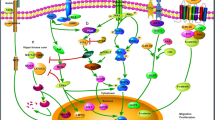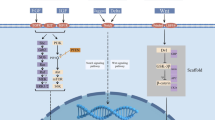Abstract
Recent results showing survival improvement with sorafenib, a multitargeted kinase inhibitor, in patients with advanced hepatocellular carcinoma (HCC) suggest the important role of vascular endothelial growth factor receptor (VEGFR)/platelet-derived growth factor receptor (PDGFR)/Ras signaling in this disease. In preclinical studies, hypoxia, along with vascular endothelial growth factor (VEGF) and VEGFR strongly promote angiogenesis in multiple models including HCC. VEGF and VEGFR, other tyrosine kinase receptors such as the insulin growth factor receptor type 1 (IGF-1R), and the epidermal growth factor receptor (EGFR)-1, along with intracytoplasmic kinases such as the mammalian target of rapamycin (mTOR) have been tested in preclinical studies and/or clinical trials and validated as potential targets for therapeutic interventions in HCC. In this review, we will update preclinical data supporting the rationale for clinical development and potential combinations using novel targeted therapies in patients with HCC.

Similar content being viewed by others
References
El-Serag HB, Rudolph KL (2007) Hepatocellular carcinoma: epidemiology and molecular carcinogenesis. Gastroenterol 132:2557–2576
Llovet J, Ricci S, Mazzaferro V et al (2007) Randomized phase III trial of sorafenib versus placebo in patients with advanced hepatocellular carcinoma. J Clin Oncol (2007 ASCO Annual Meeting Proceedings) 25(18S):LBA1
Abou-alfa JK, Schwartz L, Ricci S et al (2007) Phase II study of sorafenib in patients with advanced hepatocellular carcinoma. J Clin Oncol 24:4293–4300
Faivre SJ et al (2007) Assessment of safety and drug-induced tumor necrosis with sunitinib in patients (pts) with unresectable hepatocellular carcinoma (HCC). Proc Am Soc Clin Oncol Abstract 3546
Faivre S et al (2007) Molecular basis for sunitinib efficacy and future clinical development. Nat Rev Drug Discov 6:734–745
Semela D et al (2004) Angiogenesis and hepatocellular carcinoma. J Hepatol 41:864–880
Moon EJ et al (2004) Hepatitis B virus X protein induces angiogenesis by stabilizing hypoxia-inducible factor-1a. FASEB J 18:382–384
Yoshiji H et al (1999) KDR/Flk-1 is a major regulator of vascular endothelial growth factor-induced tumor development and angiogenesis in murine hepatocellular carcinoma cells. Hepatology 30:1179–1186
Marzullo A et al (1998) Angiogenesis in hepatocellular carcinoma: an experimental study in the chick embryo chorioallantoic membrane. Int J Oncol 13:17–21
Yoshiji H et al (1998) Vascular endothelial growth factor tightly regulates in vivo development of murine hepatocellular carcinoma cells. Hepatology 28:1489–1496
Yamaguchi R et al (2000) Expression and localization of vascular endothelial growth factor receptors in human hepatocellular carcinoma and non-HCC tissues. Oncol Rep 7:725–729
Shimamura T et al (2000) Detection of vascular endothelial growth factor and its receptor expression in human hepatocellular carcinoma biopsy specimens. J Gastroenterol Hepatol 15:640–646
Mitsuhashi N et al (2003) Angiopoietins and Tie-2 expression in angiogenesis and proliferation of human hepatocellular carcinoma. Hepatology 37:1105–1113
Liu Y et al (2005) Both antiangiogenesis- and angiogenesis-independent effects are responsible for hepatocellular carcinoma growth arrest by tyrosine kinase inhibitor PTK787/ZK222584. Cancer Res 65:3691–3699
Giannelli G et al (2006) ZD6474 inhibits proliferation and invasion of human hepatocellular carcinoma cells. Biochem Pharmacol 71:479–485
Liu L et al (2006) Sorafenib blocks the RAF/MEK/ERK pathway, inhibits tumor angiogenesis, induces tumor cell apoptosis in hepatocellular carcinoma moded PLC/PRF/5. Cancer Res 66:11851–11858
Schiffer E et al (2005) Gefitinib, an EGFR inhibitor, prevents hepatocellular carcinoma development in the rat liver with cirrhosis. Hepatology 41:307–314
Zhu AX et al (2007) Phase 2 study of cetuximab in patients with advanced hepatocellular carcinoma. Cancer 110:581–589
Thomas MB et al (2007) Phase 2 study of erlotinib in patients with unresectable hepatocellular carcinoma. Cancer 110:1059–1067
Rogler CE et al (1994) Altered body composition and increased frequency of diverse malignancies in insulin-like growth factor-II transgenic mice. J Biol Chem 269:13779–13784
Scharf JG et al (2003) The role of the IGF axis in hepatocarcinogenesis. Horm Metab Res 35:685–693
Desbois-Mouthon C et al (2006) Impact of IGF-1R/EGFR cross-talks on hepatoma cell sensitivity to gefitinib. Int J Cancer 119:2557–2566
Faivre S et al (2006) Current development of mTOR inhibitors as anticancer agents. Nat Rev Drug Discov 5:671–688
Sahin F et al (2004) mTOR and P70 S6 kinase expression in primary liver neoplasms. Clin Cancer Res 10:8421–8425
Semela D et al (2007) Vascular remodelling and antitumoral effects of mTOR inhibition in a rat model of hepatocellular carcinoma. J Hepatol 46:840–848
Rizell M, Cahlin C, Friman S et al (2007) Sirolimus retards growth of hepatocellular cancer. Proc Fifth International Meeting on Hepatocellular Carcinoma: Eastern and Western Experiences January 11–13, 2007, held in MD Anderson, Houston, Texas, Poster #3
Conflict of interest statement
No funds were received in support of this article.
Author information
Authors and Affiliations
Corresponding author
Rights and permissions
About this article
Cite this article
Faivre, S., Dreyer, C., El Maalouf, G. et al. Rationale for targeted therapies in hepatocellular carcinoma. Targ Oncol 3, 81–85 (2008). https://doi.org/10.1007/s11523-008-0079-4
Received:
Accepted:
Published:
Issue Date:
DOI: https://doi.org/10.1007/s11523-008-0079-4




